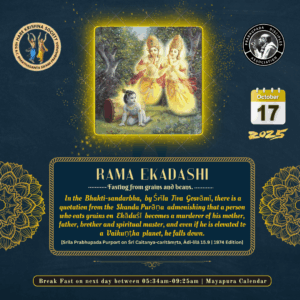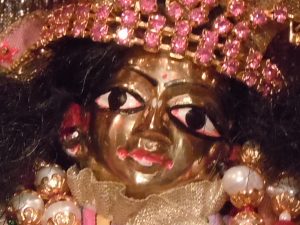Article by: Damagosha Dasa
Hare Krsna
Note–Below are two lectures tidbits. The first one Srila Prabhupada explains the difference between bhoga-tyaga-or accepting enjoyment or renunciation for the service of the Lord and gives some nice examples
NOD Vrndavana Oct 19 1972
So sometimes… Just like there is example. We asked this question,bhoga-tyāga, to our Guru Mahārāja. So… What is the difference…? Just like Rūpa Gosvāmī, he left everything for Caitanya Mahāprabhu’sservice. His lucrative service, minister post and everything, he re…Tyāga. And Rāmānanda Rāya, he was governor. He was governor andgṛhastha, and living very luxuriantly. He’s bhoga, he’s bhoga platform. Now both of them were devotees of Lord Caitanya. So what is the difference? This question was put. So our Guru Mahārāja replied: Just like a woman. According to our Vedic system, when the husband is out of home, the women is not supposed to dress herself very nicely. Proṣita bhartṛkā. It is called proṣita bhartṛkā. The system was that one should dress herself in such a way that people can understand what is her position—whether she’s unmarried, whether she’s married, whether she’s widow, whether her husband is away, whether she’s a pro…, she’s a prostitute, everything. By the dress one should understand. “She is, she is widow,” “She has got her husband,” “Her husband is now away from home.” “Oh, she is a prostitute,” “She’s not married.” In this way. Because she’s not to be asked. Simply by the dress one can understand. So the proṣita bhartṛkā. She does not dress herself, she lies down on the floor, does not change her clothes very nicely, does not dress the, comb the hair, proṣita bhartṛkā. And the same woman, when her husband is at home, she take twice bath and dresses herself, applies oil and very nice dress, ornaments, and so many things. Women know how to decorate themselves. But the… There is no difference. Her not dressing herself nicely and dressing herself nicely, it may be considered that bhoga and tyāga. But either of these positions is for center is husband. Center is husband. Therefore bhoga-tyāga is not consideration. If for Kṛṣṇa I have to give up everything, I will give up. And if Kṛṣṇa, I’ll have to accept everything, I will accept. This is required. Not the position of bhoga-tyāga, but service. If by giving up everything I can serve Kṛṣṇa well, I shall give it up, everything. And if by accepting everything I shall serve Kṛṣṇa very nicely, then I accept everything. That is required.Ānukūlyena.
Because we have to see whether Kṛṣṇa wants it, Kṛṣṇa wants it. Krsna wants Arjuna that “You become victorious in this battlefield and kill all of them.” “Yes, I shall do that.” Kariṣye vacanaṁ tava [Bg. 18.73]. If Kṛṣṇa would have asked him, “What is this fighting? You give up. Come with Me. Go to the forest,” Arjuna would have done that. So our policy is not bhoga-tyāga. Our policy is satisfaction of Kṛṣṇa. That is pure bhakti.
Sri Dwarkananda Vasudev
Note-In this lecture Srila Prabhupada explains that more we serve Krsna the more we will want to serve Krsna-totally opposite the material world, where we will do just enough to get by. He also explains the vision of a maha bhagavat pure devotee and that of the materialistic devotee. The pure devotee sees Krsna 24/7 whereas the prakrta bhakta, materialistic devotee worships his deity and only then sees Krsna. Prabhupada adds, it is not so easy, to see Krsna….
Vrndavana Oct 17 1972
Prabhupāda: So bhakti is explained, “Bhakti is some active service.” It is not a sentiment. And service means work. Not like the karmīs. Karmī or anyone who is working, he is working with some taste. Just like the example is given here: A householder is working day and night. Unless he has got some taste… Suppose one has got wife and children. So to maintain them he has to work very hard. But there is some pleasure in serving the wife and children. This is crude example. Similarly, bhaktimeans service with some taste. Svādu svādu pade pade. In the Śrīmad-Bhāgavatam it is said, svādu pade pade. The more you serve, the more you relish taste. Without relishing taste, nobody casvādun render devotional service. It is practical. Svādu svādu pade pade. In every step… Just like Rūpa Gosvāmī. He was minister in the government of Nawab Hussain Shah. So materially, he was getting honor, money, and therefore he was attached. This is also crude example. So he resigned from the government post and he joined Caitanya Mahāprabhu. So unless he tasted something better, how could he give up his government service? There must be some taste. So that is being explained here. Go on.
… So a devotee, on account of his eyes being smeared with the ointment of love of God, he sees Kṛṣṇa twenty-four hours within his heart. That is the vision of the devotee. Atheist class will say, “Where is God?” Because he has no eyes to see the God. But a theist class or a devotee, he sees God, or Kṛṣṇa, twenty-four hours. He does not see anything else. In theCaitanya-caritāmṛta it is said, sthāvara jaṅgama dekhe nā dekhe tāramūrti [Cc. Madhya 8.274]. A devotee, mahā-bhāgavata, highly advanced devotee, he sees trees, but he does not see the tree. He sees Kṛṣṇa. How? Has he gone mad? No. Actually he sees. But what is this tree? The tree, outwardly, is Kṛṣṇa’s energy. Your body, my body, the trees’s body, the dog’s body, the cat’s body. What are these bodies? The bodies are made of the external, material energy. Kṛṣṇa says in the Bhagavad-gītā, bhūmir āpo ‘nalo vāyuḥ khaṁ mano buddhir eva ca, bhinnā me prakṛtiraṣṭadhā [Bg. 7.4]. The material elements, they are simply Kṛṣṇa’s external energy. So as soon as a devotee sees anything material, he sees immediately the energy of Kṛṣṇa, and along with the energy of Kṛṣṇa, he sees immediately Kṛṣṇa. Reactory. He actually. With reference to the context.
Just like you are reading some portion of a book. As soon as there is some reference, immediately you see the person. Suppose you are phoning, talking on telephone with somebody. As soon as hear the body, as soon as hear his sound, immediately you see your friend. It is not very difficult to understand. Simply one has to know the person or one has, must have the knowledge. So one who has got knowledge, perfect knowledge of the constitution of this material body, he does not see the body. He sees Kṛṣṇa
….This is brahma-bhūtaḥ vision. A paṇḍita. Actually, when one becomes learned scholar, he becomes Brahman realized. That is the meaning of brāhmaṇa. Brāhmaṇa is one who has realized the Brahman.
Before beginning of pure devotional life, one must be Brahman realized. That is pure bhakti. That is actual, actually the platform of devotional service. Means one must be above the brahminical qualifications, a Vaiṣṇava. A Vaiṣṇava… Mad-bhaktiṁ labhate parām.One who attains the devotional service, parām, parā bhakti… There are three stages of devotional life. Arcye śilā-dhīr…
arcāyām eva haraye
yat pūjāṁ śraddhayehate
na tad-bhakteṣu cānyeṣu
sa bhaktaḥ prākṛtaḥ smṛtaḥ
yat pūjāṁ śraddhayehate
na tad-bhakteṣu cānyeṣu
sa bhaktaḥ prākṛtaḥ smṛtaḥ
A person who is worshiping the Deity in the temple with all regulative principles, arcāyām eva haraye yat pūjāṁ śraddhaya, with devotion, he’s executing the service, but he does not know how to respect a devotee, natad bhakteṣu… He has concentrated his mind on the arca-mūrti, the Deity form of the Lord within the temple… That is very nice. But if he does not now how to worship a devotee, na tad-bhakteṣu cānyeṣu, and he does not know how to elevate other persons, sa bhaktaḥ prākṛtaḥsmṛtaḥ, such kind of devotee is to be considered as material, prākṛtaḥ.Gradually, one has to become aprākṛtaḥ. So there are different stages of devotional service. Everything is explained in the scriptures.
…So unless you come to this stage, free from all designations, he cannot serve Kṛṣṇa. Kṛṣṇa accepts service from the devotee. Bhaktyāmām abhijānāti [Bg. 18.55]. Patraṁ puṣpaṁ phalaṁ toyaṁ yo mebhaktyā prayacchati [Bg. 9.26]. Kṛṣṇa is not beggar, that He has come to your place and asking some food from you. No. But Kṛṣṇa accepts your food, provided you are a devotee. That is Kṛṣṇa. You can offer Kṛṣṇa
…. And the devotee sees Kṛṣṇa and nothing but Kṛṣṇa, and twenty-four hours. It is not that Kṛṣṇa is… A devotee sees Kṛṣṇa while he’s worshiping only, and other times, he’s not seeing. No. He’s seeing twenty-four hours. But the atheists, they ask, “Can you show me Kṛṣṇa? Can you show me God?” The reply is, “Have you got the eyes to see Kṛṣṇa?” It is not so easy,Kṛṣṇa.
Those who are saintly devotees, they are seeing God, Kṛṣṇa, in every moment. Premāñjana-cchurita-bhakti-vilocanena santaḥ sadaivahṛdayeṣu vilokayanti [Bs. 5.38]. If you become saintly person by your austerities, penances, then you can see God in every step. Otherwise, if you think that “I cannot become saintly person,” yes, nobody can become saintly immediately. It requires time. But so long you are material person you can see God also in the water. You drink water. You can see God. You can see sunshine. God is there. Prabhāsmi śaśi-sūryayoḥ. So who has not seen the sunshine? Who has not seen the moonshine? So therefore if you have seen moonshine, if you have seen sunshine, you have seen God. Nod vrd oct 19 72
Some conclusions-Usually, in the beginning of devotional life, one thinks he or she can just enjoy everything and then just chant Hare Krsna. Later on, we come to think that certain activities are just not good for spiritual life and that we must renounce practically everything. So from what we hear above, Srila Prabhupada explains that our Vaisnava philosophy means yuktya vairyagya or utilizing everything for the service of the Lord. Sometimes that may mean we have to accept a position of material opulence and other times it may mean one of extreme renunciation. But in both cases if we accept those conditions in service for the Lord, He will protect us from any material reactionary effects, and we will enjoy transcendental happiness in either case.
Hare Krsna
damaghosa das
Saksi Gopal Maharaj





